|
|
|
Sort Order |
|
|
|
Items / Page
|
|
|
|
|
|
|
| Srl | Item |
| 1 |
ID:
174053
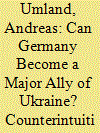

|
|
|
|
|
| Summary/Abstract |
Over the last few years, intergovernmental affairs and the roles of individual countries within the West have started to shift. In response, Kyiv (Kiev) should reorder the priorities and emphases of its foreign political, economic, and cultural policies. The central focus of this re-orientation should be more resolute than the hitherto deepening of Ukrainian relations has been, not only with the German government but also with the broader political elite, industrial companies, and the civil society of the Federal Republic. A recent systematic study of German perceptions of Ukraine can help develop new approaches, initiatives, and policies to reach a new level of German–Ukrainian partnership.
|
|
|
|
|
|
|
|
|
|
|
|
|
|
|
|
| 2 |
ID:
193173
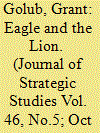

|
|
|
|
|
| Summary/Abstract |
Many accounts of the formation of American and British grand strategy during World War II between the fall of France and the Pearl Harbor attacks stress the differences between the two sides’ strategic thinking. These accounts argue that while the Americans favored a ‘direct’ Germany-first approach to defeating the Axis powers, the British preferred the ‘indirect’ or ‘peripheral’ method. However, a review of Anglo-American strategic planning in this period shows that before official U.S. wartime entry, both sides largely agreed the British ‘peripheral’ approach was the wisest grand strategy for winning the war.
|
|
|
|
|
|
|
|
|
|
|
|
|
|
|
|
| 3 |
ID:
187305
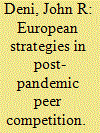

|
|
|
|
|
| Summary/Abstract |
The recent reconceptualization of national and/or defense strategies, hangovers from the sovereign debt crisis, and the impact of the pandemic-induced recession in four of the most powerful European countries – France, Germany, Italy, and the United Kingdom – will have profound implications for the United States. Through Republican and Democratic administrations, most American political leaders, experts in academia and think tanks, and other opinion leaders in the media and elsewhere have consistently held that Europe is vital to American national security. This is particularly true during an era of great power competition, as the United States works to prevent China’s authoritarian governance system and its statist economic model from becoming dominant. Given recent changes in the grand strategies of America’s most important European allies and their shifting abilities to fulfill those strategies, Washington will have an increasingly difficult time fulfilling its own goals and objectives. American strategy relies on European allies for competition with near-peers as well as defense of the global commons and projection of hard and soft power overseas to favorably influence events. Shifting capabilities, capacity, and will within Europe – all framed within evolving European strategies – will make it difficult for Washington to rely on its allies.
|
|
|
|
|
|
|
|
|
|
|
|
|
|
|
|
| 4 |
ID:
083482
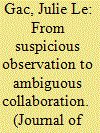

|
|
|
|
|
| Publication |
2008.
|
| Summary/Abstract |
During the first months of the Italian Campaign, partisans' activity was isolated and spasmodic, and Allied support was minimal. In fact, it took the Allies nine months to consider the Italian partisans not so much as a threat as a potential opportunity. This article seeks to explain the Allies' attitude toward the Italian partisans. Relations among the Allies, the Italian government and the partisans involved a combination of military and political problems. The Allies' weak support for Italian partisans was in fact the by-product of an overall strategic plan in which means were limited and priorities had naturally to be established in a context of world war. It also revealed their fears: the common suspicion toward irregular fighters, the growing fear of communists and the fear of possible Italian post-war demands
|
|
|
|
|
|
|
|
|
|
|
|
|
|
|
|
| 5 |
ID:
121998
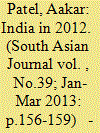

|
|
|
| 6 |
ID:
134111
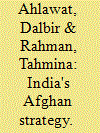

|
|
|
|
|
| Publication |
2014.
|
| Summary/Abstract |
With the deadline for the US withdrawal from Afghanistan getting closer, regional and extra-regional states have indicated pivoting their Afghan strategy. India, being an emerging power, holds much potential to contribute to the stabilisation and reconstruction of war-torn Afghanistan by developing strategic partnership with other stakeholders. For this, India's status in the regional and international system, its economic and military might and its strategy to reach beyond its traditional zone of influence warrant a systemic analysis of its Afghan strategy. The article traces the antecedents of India's current strategic and foreign policy in classical Indian strategic text Arthashstra and analyses India's present level of involvement in Afghanistan in the light of that discussion. An attempt is made in this paper to show how India's Afghan strategy is informed and influenced by its perception of allies, enemies and indifferent big powers. The paper also suggests some policy changes by critically assessing the broader context in which India operates today.
|
|
|
|
|
|
|
|
|
|
|
|
|
|
|
|
| 7 |
ID:
183406
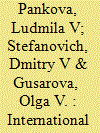

|
|
|
|
|
| Summary/Abstract |
In the coming decade, intensifying competition between great powers will
have a significant impact on the development of space activities (SA) and
on the future of international cooperation in this field. The article examines
the scope, development paths and competitive advantages of individual
countries in the field of space activities, and explores fundamental issues
of competition and cooperation. A system analysis method is used to
assess current dynamics in this area. The U.S. is expanding cooperation
with its allies, while Russia is strengthening cooperation with China in the
SA field. We note the “securitization” of SA development processes and
emphasize the expansion of the “space” dimension of the international
security agenda. There is a danger that “natural competition” may turn
into “confrontation,” which is a key factor influencing, inter alia, the need
to change the form of organization, the principles, the strategy, and the
mechanisms of international cooperation. The article also substantiates the
need to strengthen the role of international cooperation in the SA field as
a “binding” component of global security.
|
|
|
|
|
|
|
|
|
|
|
|
|
|
|
|
| 8 |
ID:
130933
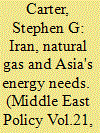

|
|
|
|
|
| Publication |
2014.
|
| Summary/Abstract |
Demand for natural gas in Asia has grown steadily during the past decade and is expected to increase considerably in the next 20 years. This growth in demand has paralleled an increasingly aggressive regime of international sanctions on Iran over its nuclear-weapons program. Considering the importance of maintaining economic pressure and political solidarity in sanctions regimes, the projected growth of demand for natural gas in some of the world's fastest-growing economies is creating both short- and long-term strategic implications for the United States and its allies. With one of the world's largest reserves of natural gas and an enviable geographical location as a likely hub for energy transit, Iran is in an excellent strategic position to benefit economically and politically from this growth in demand. While recent sanctions have dealt a damaging blow to Iran's oil exports and economy, agreement on sanctions on Iran's underdeveloped natural-gas industry has been more tepid, as nations such as Pakistan, India and China, among others, candidly weigh their options to solve increasingly dire short-term energy demand and create long-term energy security. Development of Iran's natural-gas industry to the point at which is it is able to meet demand in these nations would bring in considerable revenue for the regime, potentially enough to offset much of the economic impact of sanctions. Of particular importance to the United States and its allies, then, are answers to the following questions: Does Iran currently have the infrastructure to meet this demand? How long would it take Iran to develop the necessary infrastructure in the event nations that have expressed interest in Iran's natural gas opt against the pressure of sanctions? How likely are the above-mentioned nations to eventually contravene sanctions? How are changes in the global natural-gas industry impacting Iran's potential share of the regional and international market? And is there enough natural gas from other sources available to meet demand in nations like Pakistan, India and China?
|
|
|
|
|
|
|
|
|
|
|
|
|
|
|
|
| 9 |
ID:
131321
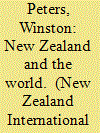

|
|
|
|
|
| Publication |
2014.
|
| Summary/Abstract |
New Zealand faces a challenging situation in a world of giants. National self-preservation must be the ultimate goal. We must ensure our security and stability in an increasingly uncertain international environment. New Zealand must look to its relationships with our traditional allies and give priority to the South Pacific. New Zealand needs to play a deft hand, and to do so it must have the requisite resources, especially of diplomats. New Zealand must have an effective, professional and well-resourced foreign service to protect New Zealand's interests. It needs to have people with the training, the experience, the judgment and the intellectual capacity to handle very complex and fluid situations.
|
|
|
|
|
|
|
|
|
|
|
|
|
|
|
|
| 10 |
ID:
190536
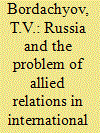

|
|
|
|
|
| Summary/Abstract |
This paper examines the nature and key features of allied relations between the great nuclear powers and other members of the international community. The author analyzes the specifics and problems of Russia's interaction with its allies in the post-Soviet space and justifies the importance and urgency of promoting the consolidation of their sovereignty and foreign policy independence.
|
|
|
|
|
|
|
|
|
|
|
|
|
|
|
|
| 11 |
ID:
158005


|
|
|
|
|
| Summary/Abstract |
After 15 years of war in Afghanistan and Iraq, many now see ‘small-footprint’ security force assistance (SFA) – training, advising and equipping allied militaries – as an alternative to large US ground-force commitments. Yet, its actual military efficacy has been little studied. This paper seeks to fill this gap. We find important limitations on SFA’s military utility, stemming from agency problems arising from systematic interest misalignment between the US and its typical partners. SFA’s achievable upper bound is modest and attainable only if US policy is intrusive and conditional, which it rarely is. For SFA, small footprints will usually mean small payoffs.
|
|
|
|
|
|
|
|
|
|
|
|
|
|
|
|
| 12 |
ID:
108525
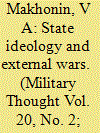

|
|
|
| 13 |
ID:
095431
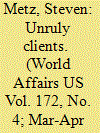

|
|
|
|
|
| Publication |
2010.
|
| Summary/Abstract |
When Congress approved a massive, five-year assistance package for Pakistan in the fall of 2009, much of it earmarked for strengthening the country's military and security forces, Pakistani leaders reacted by immediately biting the hand that was trying to feed them. During a talk in Houston, former President Pervez Musharraf slammed the conditions in the bill, asserting that Pakistan knew better than the United States how to root out terrorists. General Ashfaq Kiyani, the Pakistani army chief, labeled the offer of support "insulting and unacceptable." Members of the Pakistani parliament called the $7.5 billion appropriation "peanuts." Some of this grumbling may have been for show, another example of Pakistan's finely honed skill at extracting more and more money from the United States, but it also reflected a cynicism and sense of estrangement on the part of the Pakistani elites. And in this regard the episode highlights a central flaw in American security strategy: reliance on allies whose perceptions, priorities, values, and objectives tend to be quite different from our own.
|
|
|
|
|
|
|
|
|
|
|
|
|
|
|
|
|
|
|
|
|